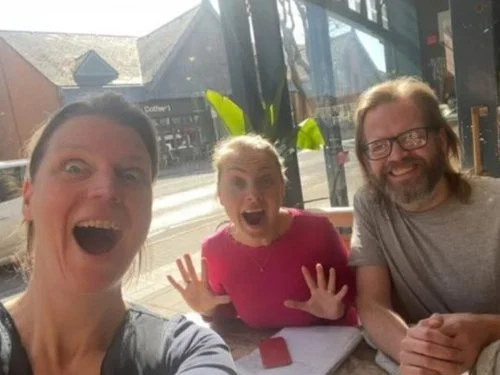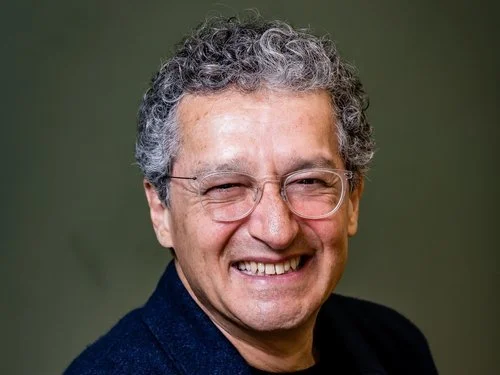Is it time to Marie Kondo your money?
For a long time, I felt weird about spending money on myself.
Even when I could afford it, there was a shadow of guilt - like joy had to be justified. Like pleasure was only allowed after all the “proper” things were paid for.
Sound familiar?
There’s a lot of noise out there about how we should manage our money.
Save more.
Spend less.
Stick to your budget.
Be sensible.
Be grown-up.
But what if budgeting didn’t have to be about guilt or self-denial?
What if it was about alignment, intention, and meaning?
That’s the shift I’ve been working on in my own life. And it’s led me to an approach I’m going to call Flonance (finance with flow).
Not finance as a cage, but finance as a compass.
Not just about the numbers, but about the energy behind them.
Budgeting, but make it meaningful
Most people think budgeting means becoming stricter or smarter.
I’m wondering if it’s actually about becoming more myself.
Instead of asking, “How can I spend less?”, what if I asked:
“What do I want to energise with my money?”
“What values am I living out through the way I spend?”
Making this change can make space for more clarity, less guilt, and better boundaries.
Maybe it will lead to less spending.
I hope it will lead to more meaning.
Because the intention is to make it easier to say no to the things that didn’t serve me.
A need for scaffolding
I’ve been to a few money workshops in my time. The deep kind.
They explored our money stories, our family systems, and the unconscious beliefs we carry.
They were powerful and revealing, but I often felt like I was being thrown in at the deep end.
I needed more scaffolding, particularly at the beginning. Something to help me hold it all without getting overwhelmed - a way to gently guide the conversation rather than drop into the abyss.
That’s why I love using the Map of Meaning.
It brings structure and softness to what can otherwise be a tricky and emotional topic.
It gives you something to stand on while you make sense of where you are.
The Map of Meaning was developed by Marjolein Lips-Wiersma and Lani Morris. It is a research-based framework that helps people understand what brings meaning to their lives and work.
I’ve loved using this map to talk about meaning, and I thought I’d adapt it to explore our relationship with spending money.
The interpretations of each quadrant that I share here are my own, shaped to help us think about spending, earning, and using money in ways that align with what truly matters to us.
The map has two intersecting axes:
The vertical axis runs between Being and Doing
The horizontal axis runs between Self and Others
This creates four core quadrants:
Integrity with Self (being + self => spending that nourishes your inner life)
Expressing Full Potential (doing + self => spending that supports your growth and creativity)
Unity with Others (being + others => spending that deepens connection and belonging)
Service to Others (doing + others => spending that contributes to a cause or the greater good)
At the centre of the map is a place where all four areas meet. That’s the sweet spot.
A moment of alignment between who you are, what you do, and how you relate to others.
Try this at home
Here’s a practical way to explore this for yourself.
Lay out two pieces of string on the floor in a cross shape. One axis represents Being to Doing. The other represents Self to Others. Don’t have string or space? Just visualise it.
Bring to mind something you spend money on, or something you’re thinking of buying. Choose something that feels a little murky, either emotionally or ethically.
Hold that item in your awareness. Then let your body respond. Which part of the map are you drawn to? What part of you does this purchase serve?
Let yourself move physically or imaginatively into that quadrant. Trust your instincts.
Pause and reflect. Where did you land? Does it affirm your choice? Or does it tell you something you weren’t fully aware of?
Decide. If it aligns, keep it. Honour it. If it doesn’t, release it. Let it go without shame.
Like Marie Kondo asks us to hold each item in our home and ask if it sparks joy, this is about holding our money choices (not just in our hands, but in our hearts) and asking: Does this reflect who I am becoming?
Not everything will make the cut. And that’s okay. The goal isn’t minimalism for its own sake.
It’s meaning. It’s alignment. It’s flow.
Money for minimalists
Come and meet me at this year's Summercamp. We’ll explore the tension between meaning and money, rewrite tired money stories, and introduce “joyful budgeting” to align your finances with your values.
What happens when you do this?
You begin to see your money not as a problem to solve, but as a map of your values.
You stop budgeting reactively and start making decisions proactively.
You say no without shame, and yes without over-explaining.
This is the kind of work we’ll be doing at Summercamp this year.
Not just with money, but with meaning, stories, and the inner architecture of your business and life.
There will be conversations, string, gentle provocations, and a group of people figuring it out together.
Budgeting, but make it meaningful
There’s one more layer to this I’ll be exploring at Summercamp.
Because how we spend money is deeply connected to how we accept it.
If you feel guilty receiving money, you’ll likely feel guilty spending it.
If you struggle to honour your worth, you may also struggle to honour your desires.
I’d like to explore the full cycle: not just what we do with money once we have it, but how we welcome it in.
How we price, how we ask, and how we allow ourselves to receive.
Because money is part of our relationship to life. And relationships, at their best, flow both ways.
PS If this idea strikes a chord with you, let me know. I'd love to hear how it lands for you.
At Summercamp, 20 transformational workshops take place in 5 tents: The Tribe Tipi, The Purpose Pod, Launch Lab, The Money Marquee, and Soul Cafe.
Other workshops at the Money Marquee
Better understand your relationship to money and how to price your worth



P.S. Tickets are now 85% sold, so get in touch if you haven't secured your ticket yet.
📒 View the full 2025 programme
💬 Hear stories from those who've attended
❓Ticket info & FAQS









